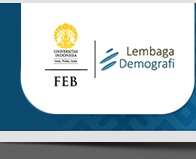Jurnal Ekonomi Kependudukan dan Keluarga
Publication Ethics Statement
Publication Ethics and Publication Malpractice Statement
This statement on publication ethics and malpractice applies to all parties involved in the publication process of JEKK, including the editor, authors, peer reviewers, and the publisher, the Demography Institute of the Faculty of Economics, Universitas Indonesia.
The statement on publication ethics and malpractice is based on the Code of Conduct and Best Practice Guidelines for Journal Editors.
Editor’s Role
- Fair play and editorial independence
The editor assesses and evaluates exclusively submitted manuscripts from the author based on their originality, validity of the study, clarity, and relevance to the journal's scope. In evaluating the manuscript, the editor does not discriminate based on race, gender, sexual orientation, ethnicity, nationality, religion, political philosophy, or institutional affiliation of the author. The Chief Editor and Managing Editor have full authority to publish all journal content and determine the publication schedule.
- Confidentiality
The Managing Editor and editorial staffs will not disclose any information about the manuscript to anyone except the author, peer reviewers, potential peer reviewers, the Editorial Board, and the publisher.
- Disclosure and conflicts of interest
The Managing Editor and Editorial Board will not use any information contained in the manuscript for research or other purposes without obtaining written permission from the author. The information obtained by the editor during the editing process is confidential and not disseminated to the public or for personal gain. In the event that an editor or Editorial Board member has a conflict of interest with the author resulting from a collaborative or employment relationship, the involved editor and Editorial Board member will appoint another editor without a conflict of interest to evaluate the manuscript.
- Publication decisions
The Managing Editor ensures that all manuscripts published undergo peer-review by at least two expert reviewers in their respective fields. The Chief Editor, with the approval of other editors, is responsible for deciding which manuscripts are to be sent for publication based on the validation of the work in question, its relevance to researchers and readers, peer review comments, and other requirements such as copyright infringement and plagiarism.
Author’s Role
- Reporting standards
The manuscript authors are expected to present an accurate account of the research/study process and its results, followed by an objective discussion of the significance of the research/study. The manuscript must contain sufficient references that allow others to replicate the work.
- Originality and plagiarism
Authors must ensure that the manuscript submitted to the journal is entirely original, and if using the work and/or words of others, proper citation is made. Publications (journals or books) that influenced the results and conclusions of the manuscript should be mentioned in the references. Manuscripts containing plagiarism will not be accepted.
Generally, the acceptable plagiarism rate ranges between 15-20%. JEKK accepts a tolerance percentage of plagiarism up to 20%. The total 20% percentage excludes direct quotes and references. A significant and consecutive percentage of similarity in one sentence or paragraph is also not acceptable, even if the total percentage is below 15%.
- Multiple, duplicate, redundant or concurrent submission/publication
A manuscript containing the same research results should not be published in more than one journal. Authors who have submitted a manuscript to JEKK are not allowed to submit it to another journal before receiving a decision from the editor. Submitting a manuscript to multiple journals simultaneously is an unethical and unacceptable practice.
- Authorship of the manuscript
The authors of a manuscript must fulfill the following criteria: a) contribute to the concept, design, implementation of the study/research, data collection, and analysis of study results, b) draft or revise the manuscript, and c) read and approve the final manuscript to be submitted to the journal. Other individuals who have contributed to the manuscript but do not meet these criteria may be acknowledged in the "Acknowledgments" section. The corresponding author must ensure that all authors have approved the final manuscript and agreed to its submission to the journal.
- Disclosure and conflicts of interest
Authors must disclose all conflicts of interest that may affect the results and interpretation of the research presented in the manuscript, including research funding, honoraria, educational grants, and non-financial relationships such as personal or professional relationships and knowledge about the material discussed in the manuscript. All sources of financial support for the research reported in the manuscript must be disclosed, including grant numbers or other reference numbers if applicable.
- Acknowledgement of sources
Proper citation of others' work must be done, and publications that influenced the results of the manuscript must be cited. Information obtained personally (from conversations, correspondence, or discussions with third parties) must be obtained with written permission from the source.
- Hazards and human or animal subjects
If the research involves hazardous chemicals, procedures, or equipment, the author must clearly identify them in the manuscript. If the work involves the use of animal or human subjects, the author must ensure that all procedures are carried out in accordance with the law and ethical committee guidelines and have obtained the approval of the ethics committee. The author must also include a statement in the manuscript that approval has been obtained for research/experiments involving human subjects. Authors must respect the privacy rights of human subjects.
- Fundamental errors in published works
If there are significant errors or inaccuracies in the published manuscript, it is the author's obligation to inform the editor and work with the editor to correct the error or withdraw the paper from the journal. If an editor or publisher is informed by a third party that a published paper contains significant errors or inaccuracies, it is the author's obligation to promptly correct or retract the paper or provide evidence to the journal editor about the accuracy of the paper.





